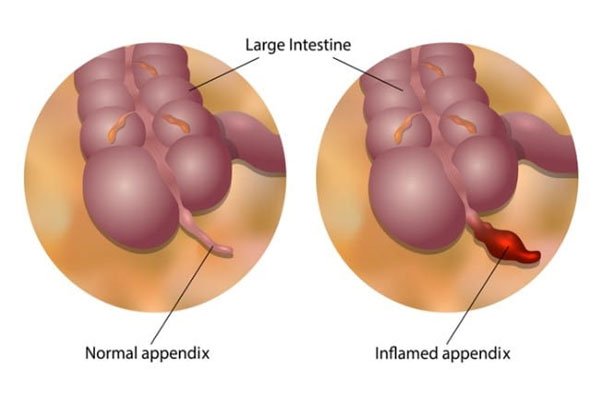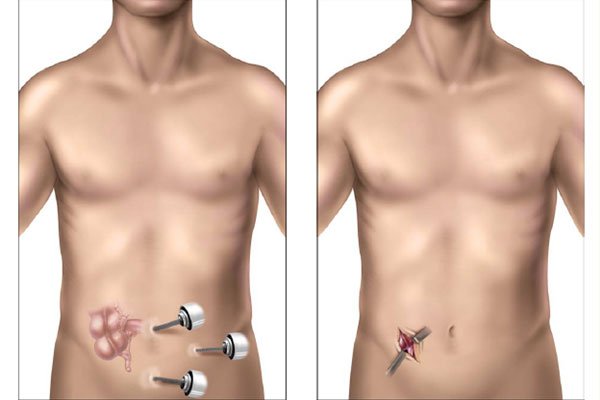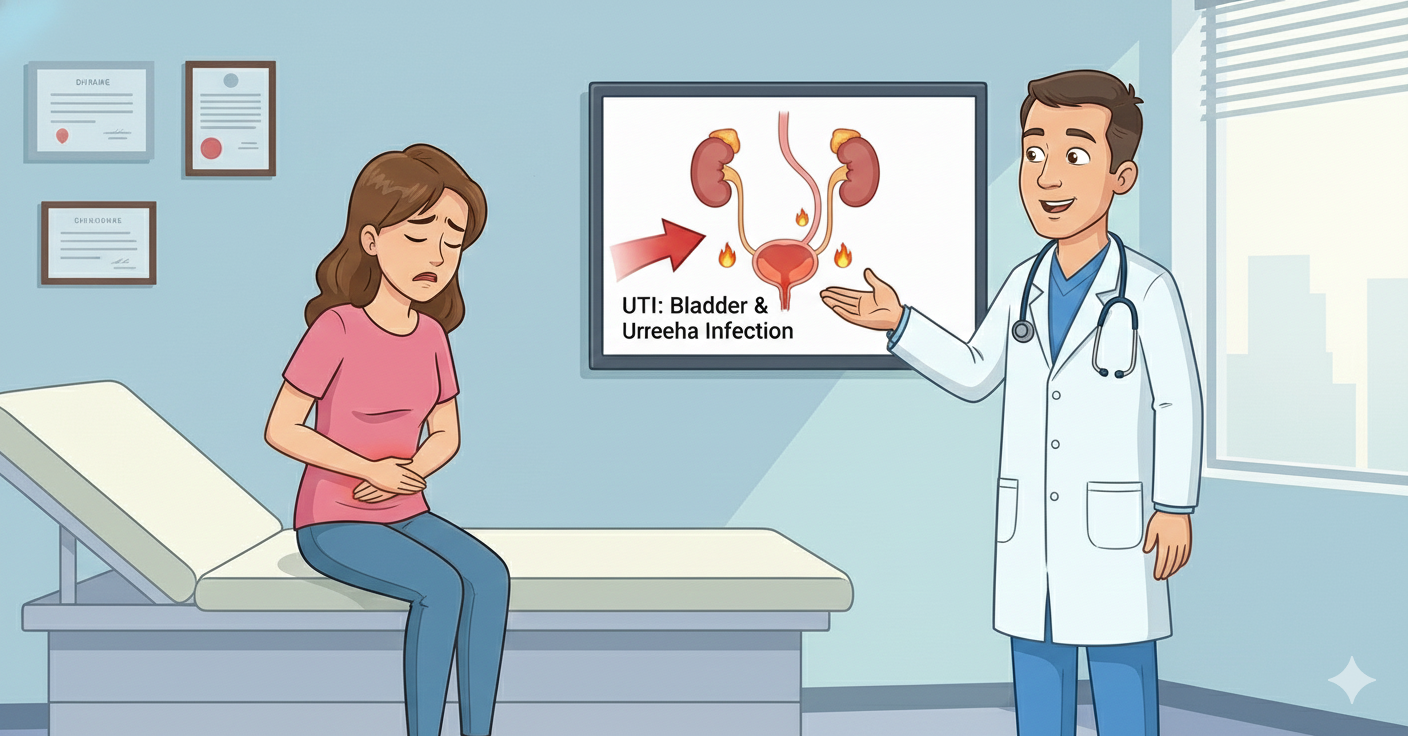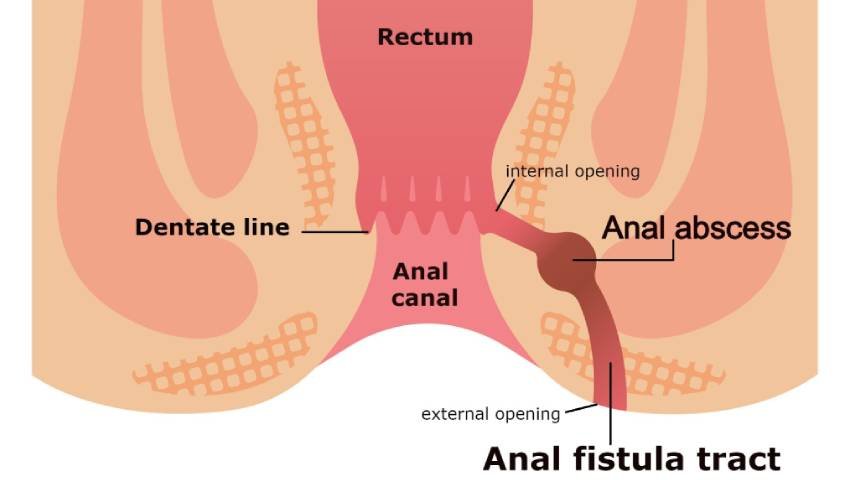What is Appendicitis?
Appendicitis is the inflammation of the appendix, a small pouch located on the right side of the abdomen. This condition occurs when the appendix becomes blocked, usually by stool, a foreign body, or cancer, leading to infection. If left untreated, it can cause the appendix to rupture, leading to a life-threatening condition known as peritonitis.

What is Acute Appendicitis vs. Chronic Appendicitis?
- Acute Appendicitis: This is the most common form of appendicitis and requires immediate medical attention. It typically develops rapidly, with symptoms worsening within hours. Surgical removal of the appendix (appendectomy) is the standard treatment.
- Chronic Appendicitis: This is a rare condition in which the symptoms of appendicitis come and go over a longer period. Chronic appendicitis is less common, and the symptoms may be milder, making diagnosis more challenging.
How Common is Appendicitis?
Appendicitis affects around 5-10% of people during their lifetime, with the highest incidence occurring between the ages of 10 and 30. It is one of the most common causes of abdominal pain leading to emergency surgery.
Symptoms and Causes
What are the Symptoms of Appendicitis?
The symptoms of appendicitis may vary, but common signs include:
- Abdominal pain: Starts near the belly button and moves to the lower right side.
- Nausea and vomiting: Often follow the onset of pain.
- Loss of appetite: A common symptom when the appendix becomes inflamed.
Fever: Typically low-grade, but it may increase as the infection worsens.
What are the Early Signs of Appendicitis?
Early signs of appendicitis can be subtle. Look out for:
- A dull or sharp pain near the belly button
- Pain that becomes sharper as it moves to the lower right abdomen
- Mild fever, nausea, or vomiting
What are Other Possible Symptoms of Appendicitis?
- Swelling in the abdomen
- Difficulty passing gas
- Constipation or diarrhea
- Painful urination
How Can I Check for Appendicitis at Home?
If you suspect appendicitis, check for pain that worsens with movement or when pressure is applied to the lower right side of the abdomen. However, do not attempt to self-diagnose; seek immediate medical attention for an accurate diagnosis.
What Other Conditions Might Be Confused with Appendicitis?
Appendicitis symptoms are similar to other conditions, such as:
- Gastrointestinal infections
- Urinary tract infections (UTIs)
- Ovarian cysts
- Kidney stones
What Causes Appendicitis?
Appendicitis occurs when the appendix becomes blocked, often due to:
- Fecal matter: Hard stools that get stuck in the appendix.
- Infections: Bacterial or viral infections can lead to inflammation.
- Tumors or growths: In rare cases, tumors can block the appendix.
What Causes Chronic Appendicitis?
Chronic appendicitis is less understood but may occur due to repeated mild blockages or infections in the appendix, leading to ongoing inflammation.
Is Appendicitis Genetic?
In some cases, appendicitis can run in families, suggesting a genetic predisposition. However, environmental factors like diet and lifestyle are more common triggers.
Can Stress Cause Appendicitis?
While stress itself is not a direct cause of appendicitis, stress can exacerbate gastrointestinal issues and may increase the risk of other digestive disorders, which could indirectly affect the appendix.
Can Food Cause Appendicitis?
No specific foods are directly linked to causing appendicitis, but a low-fiber diet might contribute to constipation, which can increase the risk of appendix blockages.
What Are the Possible Complications of Appendicitis?
If left untreated, appendicitis can lead to:
- Peritonitis: Infection of the abdominal lining.
- Abscesses: Fluid-filled pockets of infection.
- Sepsis: A severe infection that spreads throughout the body.
Diagnosis and Tests
How is Appendicitis Diagnosed?
Appendicitis is diagnosed through a combination of:
- Physical exam: The doctor will check for abdominal tenderness, especially in the lower right side.
- Blood tests: To check for signs of infection.
- Imaging tests: CT scans, ultrasounds, or X-rays to confirm the diagnosis.
What Tests Can Diagnose Appendicitis?
- CT scan: The most common and accurate test for diagnosing appendicitis.
- Ultrasound: Often used for children and pregnant women.
- Blood tests: Elevated white blood cell count may suggest an infection.
Management and Treatment
Can Appendicitis Go Away on Its Own?
No, appendicitis requires prompt treatment. If untreated, it can lead to severe complications like rupture or infection. Surgery is the most effective treatment.
What is the Treatment for Appendicitis?
- Medication: Antibiotics may be given to control infection before surgery.
- Surgery: An appendectomy is the standard treatment. This involves the removal of the appendix through a small incision or laparoscopically.
What is Laparoscopic Appendectomy?
- The surgeon makes 3 or 4 very small cuts (keyhole size) in your belly.
- A thin tube with a small camera (called a laparoscope) is put through one cut.
- The surgeon uses small tools through the other cuts to remove the appendix.
- The surgeon sees everything on a video screen.
This way, the appendix is removed safely without making a big cut.
Advantages of Laparoscopic Surgery over Open Surgery
- Smaller cuts: Only tiny cuts, not a big one.
- Less pain: Most people feel less pain after surgery.
- Faster recovery: Most patients go home the same day or next day.
- Quicker return to normal life: You can usually start normal activities within 1-2 weeks.
- Less scarring: Only small scars that are hardly seen.
- Lower risk of infection: Small cuts heal faster and are safer.
Laparoscopic Versus Open Appendectony

What is the Recovery Time After Appendectomy?
Recovery typically takes few days for minimally invasive laparoscopic surgery. For more traditional open surgery, recovery can take 4-6 weeks. Full recovery depends on the individual’s health and the method of surgery used.
Is Laparoscopic Appendectomy Safe?
Yes, it is very safe.
- It is a common surgery done worldwide.
- Serious problems are rare.
- Surgeons at Shri Tirupati Hospital are well trained and use modern techniques to make sure the surgery is very safe.
- Even older people and patients with other health issues usually do very well.
If for any reason the laparoscopic method cannot be done safely during surgery, the surgeon may change to open surgery, which is still safe.
Outlook / Prognosis
What is the Outlook for This Condition?
With timely treatment, the outlook for appendicitis is excellent. Most people recover completely within a few weeks after surgery. Delayed treatment can lead to serious complications, including peritonitis, which can be life-threatening.
Living With Appendicitis
When Should I Seek Medical Attention for Appendicitis?
Seek immediate medical attention if you experience:
- Severe abdominal pain that worsens
- Fever and vomiting
- Difficulty moving or standing
FAQ's
The appendix is a small, finger-like pouch that protrudes from the large intestine, located in the lower right side of your abdomen. It is attached to the cecum, which is the first part of the large intestine.
Appendix pain typically begins around the belly button and then moves to the lower right side of the abdomen, known as the right lower quadrant. This pain becomes sharper as the inflammation increases.
Yes, if appendicitis is left untreated, the appendix can rupture, leading to peritonitis (infection of the abdominal lining) and sepsis, both of which can be life-threatening and lead to death. Immediate medical attention is crucial to prevent serious complications.
Appendicitis occurs when the appendix becomes blocked by stool, a foreign body, or cancer, leading to infection. As the appendix becomes inflamed, the pressure builds up inside, causing pain and further complications if not treated.
Appendicitis happens when the appendix becomes blocked. The blockage could be caused by:
- Fecal matter or stool
- A foreign object or infection
- In some cases, cancer or tumors
This blockage causes bacteria to grow inside the appendix, leading to inflammation and infection.
The appendix is located on the right side of your abdomen, specifically in the lower right quadrant. It is part of the large intestine, on the side where the cecum is located.
The appendix is a part of the digestive system, specifically attached to the large intestine. Though its function is not fully understood, it is believed to play a role in gut health and immunity.
The term “appendix” is known as “अपेंडिक्स” in Hindi.
The appendix is a small, tube-like organ located at the junction of the small and large intestines. It is often considered a vestigial organ, meaning it has no major function in the body. However, it can become inflamed and infected, leading to appendicitis.
The appendix is a small, blind-ended tube that extends from the colon (large intestine). It has no significant known function, but it can become infected and inflamed, causing appendicitis, which requires prompt treatment, often through surgery.
The operation to treat appendicitis is called an appendectomy. It involves the surgical removal of the inflamed appendix. There are two main types of appendectomy procedures:
- Laparoscopic appendectomy: A minimally invasive procedure that uses small incisions and a camera to guide the surgery.
- Open appendectomy: A traditional surgery involving a larger incision to remove the appendix.
Care at Shri Tirupati Hospital
At Shri Tirupati Hospital, Ghaziabad, we offer expert care for appendicitis, including laparoscopic appendectomy for faster recovery. Our compassionate team is committed to providing you with the highest level of care.
Other Conditions & Treatments
We also treat hernias, gallstone, breast, kidney stone problems, and more.
Related Blogs
Read our blogs on gallstones: causes, symptoms, and treatments; kidney stones and more.
Get Second Opinion
Not sure about surgery? Get a second opinion from our experts.
Our Medical Experts
Our surgeons are highly trained with years of experience treating appendicitis safely.
Specialist in Location
Find the best appendix surgeons near me in Ghaziabad, Delhi.
About Shri Tirupati Hospital
Shri Tirupati Hospital is a multi-specialty healthcare centre in Ghaziabad known for compassionate care, skilled doctors, and 24×7 emergency services. We are included in the top 10 hospital in Ghaziabad list. Contact us for personalized summer health advice and treatment.
Connect With Us
Phone: 0120-2782103 / 9873363434
Website: www.shritirupatihospital.com
Follow us on Facebook and Instagram for regular health updates.
Note: This information is for educational purposes and should not replace professional medical advice. Always consult with a healthcare provider for concerns about your health.
Information reviewed and verified by-
M.B.B.S., M.S.,
Fellowship GI Oncology
Laparoscopic, Laser, Bariatric Surgeon
Healing Your Gut: The Ultimate Guide to Stomach Ulcers
Breaking the Cycle: Why Your UTI Keeps Coming Back & How to Stop It
Anal Fistula: Causes, Symptoms, and Expert Care in Delhi NCR
Itching to Know: Your Guide to Cholestasis in Pregnancy
Posted onTrustindex verifies that the original source of the review is Google. I would like to thank everyone in hospital I was so scared of surgery but everything went smoothly and all staff is very helpful and kindPosted onTrustindex verifies that the original source of the review is Google. डॉ राजीव गोयल के यहां पर सर्जरी कराई है मुझे यहां पर कोई भी परेशानी नहीं हुई है और पूरी तरह से अच्छा लगा डॉक्टर साहब को हम लोग लगभग 20 वर्षों से जानते हैं जो इनका 20 साल पहले व्यवहार था आज भी वही व्यवहार है और स्टाफ की तरफ से भी बहुत अच्छा लगा बिल्कुल घरवालों जैसी सेवा की चाहे डॉक्टर साहब वहां पर थे या नहीं उन्होंने रात को मुझे 12:00 गर्म पानी की जरूरत हुई तो स्टाफ ने लाकर दिया धन्यवाद डॉक्टर साहब बार-बार Advocate Ramlal Roza JalalpurPosted onTrustindex verifies that the original source of the review is Google. We came for my wife's surgery and it was done through cashless facility # star health. TPA staff supported a lot from admissions to discharge.Posted onTrustindex verifies that the original source of the review is Google. All Good, staff treated nicely.Posted onTrustindex verifies that the original source of the review is Google. Nice hospital and management of facilities. Staff is supportive and helpful.Posted onTrustindex verifies that the original source of the review is Google. We came here for my mother's operation after my friend's suggestion and the best decision we made to visit here and took treatment by Dr. Rajeev Goel. She got Speedy recovery and she is completely fine now.Posted onTrustindex verifies that the original source of the review is Google. My operation was done here through cashless # star health and honestly very nice management I have seen here. Staff supported and helped a lot they talk so nicely. Dr. Lakshay Goel is very helpful.Posted onTrustindex verifies that the original source of the review is Google. My wife's operation was done here through cashless facility # Star health and whole documentation was done very smoothly and TPA staff is very supportive. Dr. Rajeev Goel is very nice doctor.Posted onTrustindex verifies that the original source of the review is Google. We recently visited Shri Tirupati Hospital and we are really very impressed by the management and maintenance of the hospital. Everything is perfectly managed and nice facilities. Highly recommended this hospital to all.Posted onTrustindex verifies that the original source of the review is Google. My operation of hernia was done here in Shri Tirupati hospital by Dr. Lakshay Goel and honestly he is very friendly and kind natured. He understands our concerns and supported a lot.




